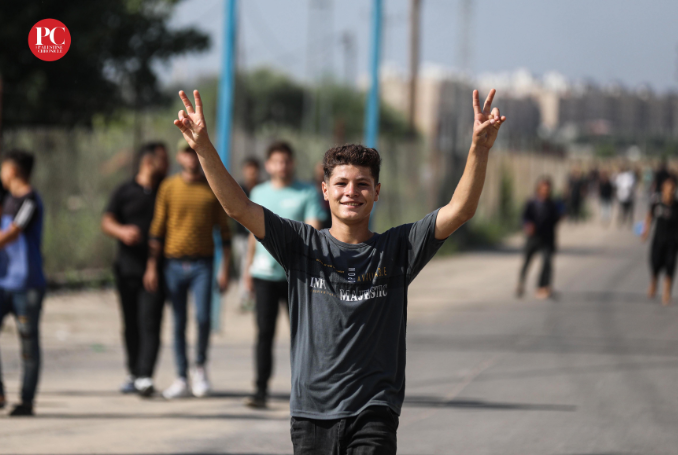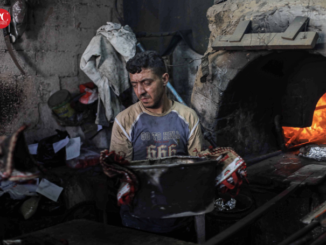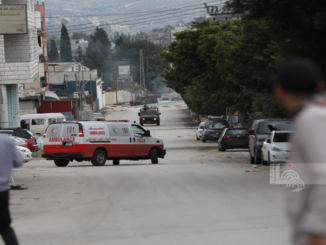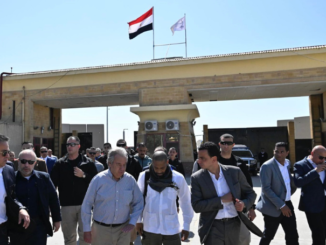
By Benay Blend
Different from the heroic narrative that values individual heroism, sumud is a collective response to hardship, a stance that Zinn would have understood.
In his autobiography, ‘You Can’t Be Neutral on a Moving Train: A Personal History of Our Times ‘(1994), the late historian Howard Zinn explained his philosophy of teaching.
He never pretended to be objective, partly because he believed that while there might be two sides to a situation, each side does not always carry the same moral weight. Refusing to indoctrinate his students, he told them instead that “you can’t be neutral on a moving train,” meaning that “events are already moving in certain deadly directions, and to be neutral means to accept that” (p.9).
In a recent article, Reverend William Barber, founder of the Poor People’s Campaign, called the actions of the resistance on October 7th “senseless acts of violence” that do not merit being placed into the context of a reaction against 75 years of Occupation.
In order to bolster his bolster his condemnation without mentioning the decades of oppression that precipitated it, Barber chose an ahistorical argument that negated all of the documented slave revolts that occurred before the Civil War. On one side of his family, he claimed, there was a long line of formerly enslaved people who chose not to revolt against their masters until the Civil War.
Perhaps true in his family, yet Barber dismissed Herbert Aptheker’s American Negro Slave Revolts (1943), a groundbreaking rendition of the major slave revolts—Nat Turner and Denmark Vesey—but also the many times that enslaved people revolted in other ways.
“Hate cannot drive out hate,” he concludes. “We must meet one another in our shared grief and find a better way.”
Barber is thus calling for a moral equivalency between occupier and occupied, exactly what Zinn had said is wrong. Essentially, he is asking Palestinians to engage in the out-worn practice of normalization, as if the occupied live a normal existence under occupation.
Moreover, Barber is ignoring that systemic issues cannot be solved this way. When Barber organized his Poor People’s Campaign around the idea of a “moral revival” it faced the same inherent problem: how do you change systemic racism, economic disparity, and political corruption by simply challenging the country’s morals?
The anti-slavery advocate William Lloyd Garrison employed similar tactics to vanquish slavery. Through shaming slaveowners, he thought he could solve the problem. As a former slave, Frederick Douglass knew better. Slavery was far too complex as an economic system and a cultural way of life to give way without a war.
In 2018, Barber’s voice was different. Speaking on Now This News, he claimed that it was the responsibility of all to speak for the rights of displaced Native people, wherever they might be, something that he knew this from his “own personal story.” Moreover, he explained that “we cannot talk about justice without addressing systemic racism,” a claim that he seems to ignore a few years later when justice becomes for him a personal matter between individuals.
Indeed, he compared the “colonial mindset that enslaved black bodies and called it Christian” with the system used to displace Palestinian families by calling it pro-Israel. What happened in the intervening years to change his stance?
In an article dated one year ago, Omar Zahzah noted the emergence of “a new, coordinated generation of Palestinian resistance fighters,” an action that was met with a “problematic, obsessive iteration of ‘nonviolence’” within the broader solidarity movement.
That position, he believes “dehumanizes Palestinians, normalizes Zionism, and ultimately utilizes racist and colonial frameworks to advance the notion that the means of Palestinian resistance are more troubling than the reality of Zionist settler-colonialism.”
When resistance fighters are called terrorists, when October 7th has no historical context, this seems to be happening again.
Moreover, when decolonization happens only in the classroom or in the texts, it’s difficult for some to deal with it in person. For historian Robin D.G. Kelley, it “begins with ending the occupation, guaranteeing the right of return and restoring all stolen land and property” (Freedom Dreams: The Black Radical Imagination, 2022, p. xxxvii). Having traveled to Palestine in 2012, and again in 2018 with Diné organizer Melissa Tso, Kelley witnessed apartheid and settler colonialism firsthand.
The response to Reverend Barber was swift. For example, Reverend Graylan Scott Hagler charged that Barber’s “ahistorical criticisms of Palestinian resistance show a profound ignorance of the history of settler colonialism endured by Palestinians.” Senior Advisor to The Fellowship of Reconciliation, USA and Pastor Emeritus of Plymouth Congregational United Church of Christ in Washington, D.C., Hagler also led a group of Black Clergy in 2016 to Palestine to witness the life of Palestinians under Israeli apartheid and Occupation.
Charging that Barber ignored, or at best placed secondary, the long history of Palestinian suffering, Hagler explains that for too long the world has ignored the brutality of the Occupation, a stance that he understands because in this country Black lives seldom seem to matter.
“President Biden is included in this criticism,” he continues, “and so is every leader and head of state who has turned a blind eye or kept their mouths shut during this continuing tragic history.”
Similarly, Hagler claims that Barber’s “voice would ring truer and be less self-serving” if he had spoken out against apartheid in the past.
In 1974 Hagler led a delegation to Palestine at a time when it was not common and/or popular to do so. Inspired by the oppression that he saw, Hagler has since been following the plight of Palestinians, particularly when “Israeli acts of injustice have taken place in plain view” but met with only “callous silence.”
Shortly after the events of October 7th, Hagler wrote another piece, calling for the public to acknowledge “Who is to Blame” for the bloodshed. Then as now, he writes, corporate media has “never covered the taking of a Palestinian young life with the same outrage and passion over the taking of a young Israeli life.” Indeed, there has been much coverage by the media of Israelis mourning the loss of family members, homes, and so on, but little to no coverage of the same by Palestinians, when the latter have been experiencing what Israelis feel now for the past 75 years.
“There is a lot of blame to go around,” the pastor says. In addition to the media, he calls out the U.S. government’s unconditional support of Israel in the form of military aid that will only be increased to enable Israel’s latest “war.” Hagler also reprimands Zionist groups that have “manipulated tax-exempt laws to fund ethnic cleansing initiatives.”
“There is much blame to go around,” he concludes: groups like the Anti-Defamation League (ADL) who bully people into silence by equating criticism of the Israeli government with antisemitism; “justice-caring people” who have remained silent out of fear of being labeled antisemitic; every Israeli who marched against Netanyahu’s judicial reforms but “did not equate the ongoing occupation of Palestinian lands with fascist authoritarianism”; and finally, Christian churches who preach that God promised the land to the Jews,” but remained silent when Christian churches were violated by Zionists along with desecration of Muslim mosques.
Hagler ends by asking where are the voices that go beyond the call for a ceasefire to include demands that include calling for “a peace table where every segment of Palestinian society is at that table, and not just those that the West and Israel can tolerate?” These are strong words from a pastor who depends on donations and dues to keep his congregation running.
Hopefully, others can match his courage by calling out imperialism as the “primary enemy of the Palestinian cause,” by understanding our own role as tax-payers whose funds contribute to the carnage, and by not repeating the media’s equating of the Resistance with Terrorism rather than a liberation movement born of the past 75 years-worth of oppression.
Zinn ends his autobiography with a statement that summed up his philosophy of life: “To be hopeful in bad times is not just foolishly romantic,” he concluded. “It is based on the fact that human history is a history not only of cruelty, but also compassion, sacrifice, courage kindness” (p. 208). He continues: “What we choose to emphasize in his complex history will determine our lives.
If we see only the worst, it destroys our capacity to do something” (p. 208), a state of immobility that perhaps many are feeling now. “If we remember those times and places…where people have behaved magnificently, this gives us energy to act, and at least the possibility of sending this spinning world in a different direction” (p. 208).
At this moment in time, Palestinians in the homeland and in the diaspora are maintaining their traditional sumud (steadfastness). Defining sumud as inherently optimistic, Laleh Khalili explains that it refers to the nation’s perseverance in dire times (Heroes and Martyrs of Palestine, 2007).
Different from the heroic narrative that values individual heroism, sumud is a collective response to hardship, a stance that Zinn would have understood.

– Benay Blend earned her doctorate in American Studies from the University of New Mexico. Her scholarly works include Douglas Vakoch and Sam Mickey, Eds. (2017), “’Neither Homeland Nor Exile are Words’: ‘Situated Knowledge’ in the Works of Palestinian and Native American Writers”. She contributed this article to The Palestine Chronicle.







